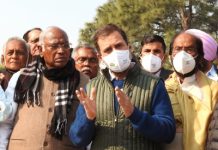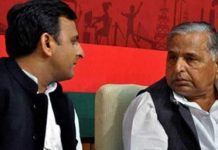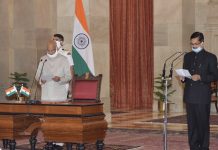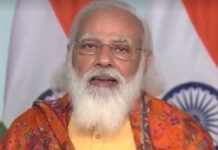Delhi and Mumbai offices of the BBC have been raided by IT officials over alleged irregularities. However the timing of raids raises suspicion as these have occurred just a few weeks after the release of 2-part BBC documentary which was banned by the government, writes Mudit Mathur
Amid global criticism over Income tax raids at Delhi and Mumbai offices of the British Broadcasting Corporation (BBC) over alleged non-compliance with the Transfer Pricing Rules and its vast diversion of profits, the sleuths continued its survey operations on second consecutive day after overnight quizzing of its staff associated with finance and commercial department. Journalists were allowed to go home.
The timing of such action raises suspicion as it has occurred a few weeks after the release of two-part BBC documentary entitled “India: The Modi Question”, which was quickly blocked from airing in India by the government using emergency provisions. During the black days of emergency, former Prime Minister Indira Gandhi closed downed BBC offices while curbing democratic rights of the citizens and muzzling press freedom in India.
While there has been no official statement from the Income Tax department on the action, the British Broadcasting Corporation (BBC) has said it was cooperating with the authorities. BJP spokesperson Gaurav Bhatia alleged that BBC is the “most corrupt organisation”. “BBC is “Bhrasht Bhakwaas Corporation” (corrupt, rubbish, corporation),” he said.
“Income Tax Department must be allowed to do its work,” Bhatia said, adding that “if BBC did no wrong, then why are scared”. Bhatia also said the BBC should not “spew venom” while operating in India. “The BBC indulges in anti-India propaganda,” Bhatia told reporters.
The action of the Modi government triggered vast reactions across the international media and political circles questioning media freedom as a basic guarantee in a democracy as provided in “The Universal Declaration of Human Rights”proclaimed by the United Nations General Assembly in Paris on 10 December 1948 as a common standard of achievements for all people and all nations. According to it, “Everyone has the right to freedom of opinion and expression; this right includes freedom to hold opinions without interference and to seek, receive and impart information and ideas through any media and regardless of frontiers.” The sprit of declaration has been adopted in the Constitution of India as Fundamental Rights.
New York-based independent non-profit Committee to Protect Journalists (CPJ) urged the Indian government to stop harassing journalists and said, “Indian authorities have used tax investigations as a pretext to target critical news outlets before, and must cease harassing BBC employees immediately, in line with the values of freedom that should be espoused in the world’s largest democracy.”
The Guardian, a leading UK newspaper, reported, “The BBC is just the latest organisation to be hit with a tax evasion investigation following reports that have reflected poorly on the Modi government. Tax raids have been carried out on Oxfam and several thinktanks, while Amnesty International, which had documented the erosion of human rights and persecution of minorities, had to shutter its India operations in 2020 after its accounts were frozen by a central government agency.”
France24.com, the French state-owned international news television network, said: “Press freedom in the world’s biggest democracy has suffered during Modi’s tenure, rights activists and opposition lawmakers say. India has fallen 10 spots to 150 out of 180 countries in the World Press Freedom Index since Modi took office in 2014. Critical reporters, particularly women, say they are subjected to relentless campaigns of online abuse.”
The Independent UK said: “Modi’s government has in the past been accused by rights organisations of using allegations of financial misconduct to target its critics, including NGOs, journalists, news organisations and politicians.”
The New York Times reported: “The Indian authorities under Mr Modi have often used such raids against independent media organisations, human rights groups and think tanks in what activists call an effort to harass critical voices into silence by targeting their funding sources. Rights groups have repeatedly expressed concern about the dwindling freedom of the press, with journalists and activists thrown in jail for long periods or mired in court cases that drag on in India’s labyrinthine judiciary.”
The Press Club of India and Mumbai Press Club strongly condemns the Income Tax “surveys” at the offices of the BBC in India.The “surveys” are part of a series of attacks on the media by government agencies in recent times, especially against those sections of the media that the government perceives is hostile to it and critical of the ruling establishment. The Editors Guild of India also expressed its deep concerned about the Income Tax surveys at the offices of BBC India soon after the release of two documentaries on 2002 violence in Gujarat and current status of minorities in India.
“In September 2021, offices of News Click and Newslaundry were similarly “surveyed” by IT department. In June 2021, there were surveys against Dainik Bhaskar and Bharat Samachar. In February 2021, the ED had conducted raids at the office of NewsClick. In each case, the raids and surveys were against the backdrop of critical coverage of the government establishment by the news organisations,” the statement of Editors Guild of India added.













